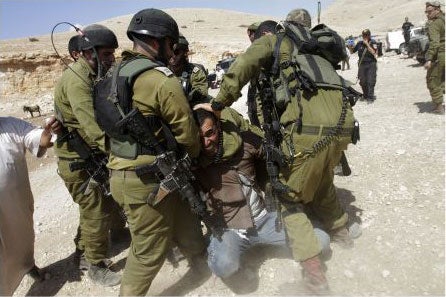Rouhani’s Favourite Village: After erasing Makhul, Israel might see support from the US evaporate
The US is being torn between the old alliance with Israel and a conversation with Iran

Your support helps us to tell the story
From reproductive rights to climate change to Big Tech, The Independent is on the ground when the story is developing. Whether it's investigating the financials of Elon Musk's pro-Trump PAC or producing our latest documentary, 'The A Word', which shines a light on the American women fighting for reproductive rights, we know how important it is to parse out the facts from the messaging.
At such a critical moment in US history, we need reporters on the ground. Your donation allows us to keep sending journalists to speak to both sides of the story.
The Independent is trusted by Americans across the entire political spectrum. And unlike many other quality news outlets, we choose not to lock Americans out of our reporting and analysis with paywalls. We believe quality journalism should be available to everyone, paid for by those who can afford it.
Your support makes all the difference.On Thursday, the Independent reported the demolition of Makhul. Not long before Netanyahu boycotted Rouhani’s speech at the UN, Israeli soldiers bulldozed the tiny village, barring the Red Cross from aiding those who were left homeless.
Makhul is a Palestinian village nestled in the Jordan Valley, a territory occupied by Israel as part of the West Bank since the Six Day War of 1967. Both Israelis and Palestinians claim this fertile land as their historic home, but Makhul’s Bedouin population were powerless to stop the Israel Defence Forces (IDF) from evicting them.
Ahead of his address to the United Nations on Tuesday, Israeli prime minister Benjamin Netanyahu would do well to consider where this leaves his friendship with the US, in light of the recent rapprochement with Iran.
Hassan Rouhani’s speech to the Security Council last week marked a sea-change for Iran’s relations with the US. His commitment to a transparent nuclear policy prompted talks with the US on the subject, which were later lauded by Secretary of State John Kerry for validating Iran’s change in "tone".
But another part of Rouhani’s speech will make Kerry anxious about his breakthrough. The recently elected President of Iran described Israel instigating an ‘apartheid’ with Palestinians in the West Bank. Rouhani made clear that the ongoing repression amounted to ‘nothing less than structural violence’.
Makhul certainly gives credence to this claim. Indeed, the story told by Burhan Bisharat, a resident interviewed in the Independent’s article last week, reeked of the slum clearances seen in South Africa forty years ago. Residents were removed from their homes by force, and denied crucial aid by humanitarian groups.
Pressed for an answer on Makhul, Netanyahu might respond that the evicted residents had lived there illegally, with no license granted to build homes. He might also remind us that the Israeli high court condemned the army for preventing aid getting to the Palestinians they left without shelter.
Both replies would reflect an insidious persecution of Muslims living in the Jordan Valley. Men like Burhan had no chance of getting permission to build and live in Makhul; the local authorities see the West Bank as Israeli land, for Israelis. And, however noble the high court’s castigation of the IDF, the fact remains that the military had to be told to stop blocking the Red Cross from the desolation.
This kind of persecution was enabled by the Israeli state up until the point where it risked inviting more international scrutiny. Makhul vindicated Rouhani’s concern for Palestinians, putting a name to the “brutal repression” he pinned on Israel.
This week, Netanyahu could look to justify events in the West Bank. If he does, Kerry will find himself torn between the old alliance with Israel and a conversation with Iran which promises new stability in the region. At stake is a groundbreaking dialogue with Iran on its nuclear weapons programme.
Last week, Bedouin villagers were the target of real persecution by the state of Israel, authenticating Rouhani’s claims about “apartheid” in the West Bank. This week, Netanyahu should be cautious in assuming Obama’s uncompromising support.
We were never supposed to hear about Makhul being wiped from the map. Now, its name could isolate Israel while new channels of diplomacy open up between Washington and Tehran.
Join our commenting forum
Join thought-provoking conversations, follow other Independent readers and see their replies
Comments